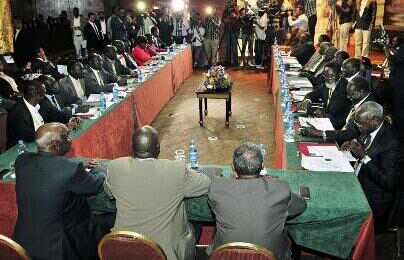IGAD urges S. Sudan’s warring parties to finalise peace deal
February 23, 2015 (ADDIS ABABA) – As South Sudan peace talks resumed on Monday officials from the Intergovernmental Authority on Development (IGAD) urged both sides to adhere to their commitments to end the conflict, in what has been dubbed the last chance for the warring parties to sign a final peace agreement,

“Today (Monday), we begin the final session of negotiations for the IGAD-mediated South Sudan peace talks. This is the final opportunity to make progress, and usher in a new era of peace in South Sudan. We must not fail,” he said.
He further called on the parties to make genuine compromises and conclude a final peace agreement by 5 March deadline so that a pre-transitional period can begin on 1 April and transitional government of national unity can be formed no later than 9 July this year.
The chief mediator further announced that thematic committees on transitional security arrangements, governance, economy, justice and humanitarian affairs and leadership structure would immediately resume negotiations on Tuesday.
He stressed the importance that the parties would complete their tasks by closing the gap between their positions and finalise the harmonisation of all of the thematic areas in time.
However, Mesfin decried ongoing violations of the cessation of hostilities agreement signed on 23 January 2014 and recommitted to on many other occasions.
The ceasefire deal called on all foreign allied troops and rebel groups to withdraw from South Sudan, but this has not happened as Ugandan troops notably continue to participate in the war on the side of president Kiir’s government.
PRINCIPALS MUST MEET
IGAD’s chief mediator also called on Kiir and Machar to keep their 1 February promise for a face-to-face meeting in order to thrash out outstanding issues beyond agreement by their delegations.
Earlier, Kiir’s official spokesman of the government, Michael Makuei Lueth, said his boss would no longer take part in the peace talks this time, saying he would only show up in case of a signing of an agreement.
But Mesfin rejected the new position of the government and reminded the two leaders to abide by the previous agreement.
“We, the IGAD special envoys, call on the warring parties to ensure that the meeting of the two principals, as agreed on February 1, occurs without further delay. This is the commitment that was made by the two principals on 1 February, and it is the expectation of the people of South Sudan, the IGAD region, Africa and the international community at large that this commitment will be fully honoured,” he said.
From London, United Kingdom’s (UK) foreign office minister Baroness Joyce Anelay also expressed concern about the recent change of mind by president Kiir, further urging him to adhere to his commitment.
“I am concerned that it has been announced that President Kiir will not travel to Addis Ababa for this final round of talks, reversing a previous commitment to regional leaders,” Anelay said in a statement.
She called on the South Sudanese leaders to use this final round of talks to honour their commitments and make the necessary compromises and secure peace for the people of South Sudan.
Anelay also expressed concern that the recent proposal by Juba to modify the transitional constitution to extend the mandate of president Kiir and the national legislature by two years “must not be used as a reason to delay concluding a peace agreement by 5 March”.
The principals of the warring parties have two weeks within which to agree on all the outstanding issues and conclude a final peace agreement.
OUTSTANDING ISSUES
On governance the parties will have to agree on system of governance, restructuring of the state or reforms in various sectors.
The rebel group demanded adoption of a federal system of governance on the basis of which to restructure the state and implement reforms from the transitional period. Government is reluctant and prefers to defer the issue of federalism to permanent constitutional making process for consideration.
The parties are yet to tackle interim security arrangements on the status of their forces, reforms and transformation of the security sector.
Rebels wanted separate forces during pre-transitional period with gradual amalgamation of the two armies during the transitional period. Government wanted immediate reintegration after pre-transitional period and added that it would only accept back into the army those who defected from the regular forces, rejecting the White Army and other new recruits.
Wealth-sharing and economic reforms will also dominate discussions by thematic committee on economy. Wealth-sharing percentages from natural resources and other sources of revenues have not yet been agreed.
While the government is comfortable with the status quo, the opposition group wanted higher percentages given to the states that produce resources, among others.
Leadership structure is yet to be further negotiated as well as how to tackle accountability, justice, reconciliation as well as compensation and reparation for the victims of the 15 December violence.
The 14-month-long conflict erupted in mid-December 2013 when political debates on reforms within the ruling SPLM party turned violent.
Tens of thousands have been killed so far, with two million displaced from their homes and over three million more threatened by hunger and diseases.
IGAD, the African Union (AU) and United Nations (UN) have threatened to impose sanctions and other measures on the belligerent parties should they continue to engage in armed conflict.
(ST)
